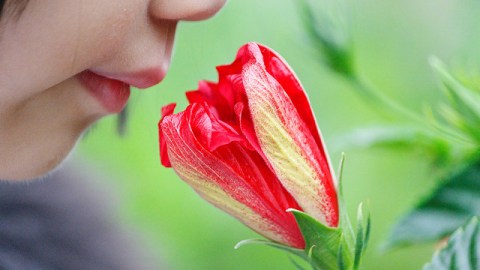Creating the Scent of a Virgin: A Lesson on Fine Fragrance Perfumery

When you smell a ripe strawberry or your morning coffee, what you’re really smelling are hundreds of molecules, says fine fragrance perfumer Chistophe Laudamiel. But that doesn’t mean the brain of even the best nose in the world registers all of these molecules.
“It’s processed like patches, like facets. And ven the best experts can smell only five to eight facets at a given time,” explains Laudamiel during his Big Think interview. “For the brain to register a facet, you have to have at least several components for each facet which together are going to give this signature that then you will recognize as coffee. But you won’t be able to recognize the different things that you would see in coffee. Some of them, if you take them one-by-one… smell like raw potato, another one is going to smell like smoke, another one like toasted bread, another one like earth, and et cetera.”
Laudamiel is a French fragrance designer who has created for Abercrombie & Fitch, Frederic Fekkai, Cath Kidston, The Estee Lauder Companies, Ralph Lauren Fragrances, Harvey Nichols, and Slatkin & Co. He is also the author of Green Aria, a scent opera pairing music with a carefully orchestrated series of smells, which audience members receive through “scent microphones” while sitting in a darkened theater. “It’s been a dream in the minds of many people to associate the excitement of sense and olfaction and perfumes with other elements from the entertaining world,” says Laudamiel, who describes in detail the challenges he met while creating the 23 scents featured in his thirty minute “performance.”
Conceiving of interesting fragrances is just a regular day at the office for Laudamiel, who in his attempt to turn fragrance into high art has also aimed to recreate the scents of things not typically associated with smell. “Here the inspiration is not about sandal wood or patchouli, the inspiration is about an emotion or sensation. So you have to use elements which have a similar smell in those similar situations,” says Laudamiel. When he was asked to recreate the smell of fear, for instance, Laudamiel concentrated on smells that we associate with uncomfortable or fearful environments, and when he was asked to recreate the scent of a virgin, he focused on the scents of milky elements like rice and the soft and velvety scents of water lily and apricot skin. Of course, to add a little human je ne sais quoi to the fragrance, he also added an a few aldehydes, which helped to mimic the notes that our decomposing skin emits regularly.





